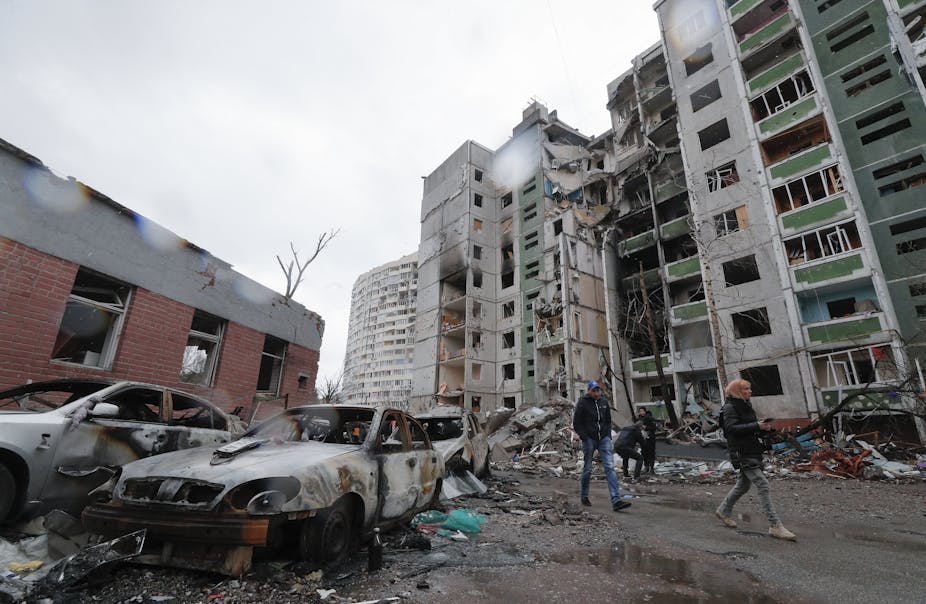South Africa has been roundly criticised for its decision to abstain from voting on three UN General Assembly resolutions condemning Russia’s invasion of Ukraine.
The first resolution, on 2 March, demanded that Russia immediately stop its aggression and withdraw its troops. The second on 24 March demanded full humanitarian access and protection of civilians and humanitarian personnel in Ukraine. The third on 7 April called for Russia to be suspended from the UN Human Rights Council because of its gross and systematic violation and abuse of human rights.
South African President Cyril Ramaphosa’s defence is that international criticism and economic pressure against Russia may succeed in ending hostilities, but will not result in lasting peace. Long-term peace will be only be achieved through dialogue and negotiations.
Ramaphosa grounds this stance in South Africa’s negotiated settlement in the early 1990s. This ensured a relatively peaceful transition from the dark days of apartheid to the bright light of a constitutional democracy.
During the transition Ramaphosa himself was an immensely impressive negotiator for the African National Congress (ANC), the leading liberation movement. But his position on a negotiated settlement for Ukraine is apolitical, ignoring the necessity for sustained pressure to compel conflict parties to engage in negotiations. Without this pressure, Russia will continue with its merciless military attacks.
Read more: Ukraine war: fresh warning that Africa needs to be vigilant against Russia's destabilising influence
As an international mediation scholar and practitioner based at the Kroc Institute for International Peace Studies, I argue that South Africa’s stance is counter-productive if it wants to contribute to a peaceful resolution of the crisis in Ukraine.
Pressure supports negotiations
When conflict parties are locked in hostilities, they are intent on defeating their adversary. They are not interested in ending the conflict through negotiations, which inevitably entail compromises. The critical political and strategic question confronting the international community is this: what steps can be taken to convince the parties to agree to serious negotiations?
South Africa’s history provides an answer to this question: a combination of sustained international sanctions, domestic mass resistance and armed struggle – the Soviet-backed armed struggle of the ANC eventually forced the minority regime to the negotiating table. Pressure is thus not the opposite of negotiations. Rather, it is a vital means for kick-starting serious negotiations.
Ukraine and Russia have not reached the point of serious negotiations. They remain locked in a military struggle, with Russia believing it can still make gains through the use of force. It is far-fetched to imagine that President Vladimir Putin will respond positively to mere exhortations to settle the conflict peacefully. Only a combination of Ukrainian resistance and intense international pressure will change his cost-benefit calculation away from fighting and towards negotiations.
Read more: Sanctions against Russia will affect arms sales to Africa: the risks and opportunities
Ramaphosa also opposes criticising Russia on the grounds that South Africa’s neutral stance will place it in a stronger position to help mediate an end to the conflict. The benefit of neutrality, he says, “is that we can talk to both sides”.
Here, too, Ramaphosa is mistaken. International mediators cannot be neutral regarding international law. They are bound by – and are expected to promote - the UN Charter, which prohibits states from using force other than in self-defence or as authorised by the UN Security Council. Mediators must also respect and promote the Universal Declaration of Human Rights and international humanitarian law. These instruments are upheld in the first and second UN resolutions on Ukraine, which South Africa declined to endorse.
South Africa seen as biased
While international mediators cannot be neutral, they must endeavour to be impartial. This means they must mediate in a manner that is fair to all the conflict parties. Like a referee in a sports match, they should not exhibit bias against or in favour of any side. Their job is to assist the parties reach agreements that the parties themselves deem satisfactory. The only caveat is that the agreements must be consistent with international law.
In reality, Pretoria is not perceived as impartial. It refers to Russia’s illegal invasion of Ukraine as a “military operation”, which is Putin’s euphemism for whitewashing his act of aggression. Siding with Putin in this way will undoubtedly cause Ukrainian President Volodymyr Zelenskyy to be sceptical about South Africa’s possible involvement as a mediator.
Read more: Russia's nuclear power exports: will they stand the strain of the war in Ukraine?
When the General Assembly debated the second UN resolution, South Africa proposed an alternative resolution that focused on the humanitarian dimensions of the conflict and ignored Russia’s ongoing responsibility for the crisis. The proposed resolution, which failed to garner sufficient votes, did not even mention Russia.
Needless to say, Russia supported this approach. Ukraine, on the other hand, denounced it. According to the Ukrainian ambassador to the UN, focusing exclusively on humanitarian issues was
The most prominent mediator to date has been Turkey. At the end of March direct talks between Russian and Ukrainian negotiators took place in Istanbul. Yet Turkey, unlike South Africa, has not refrained from voting to support the UN resolutions condemning Russia.
Ramaphosa complains that the UN resolution of 2 March did not make an adequate call to resolve the conflict by peaceful means. But the resolution is actually very clear on this:
(It) urges the immediate peaceful resolution of the conflict between the Russian Federation and Ukraine through political dialogue, negotiations, mediation and other peaceful means.
South Africa has squandered its potential to play a constructive mediation role in the Ukraine crisis. Instead of drawing on the lessons of its own negotiated settlement and its rich history of peacemaking in Africa, it has adopted a position that amounts to appeasing Russia’s aggression against Ukraine.

